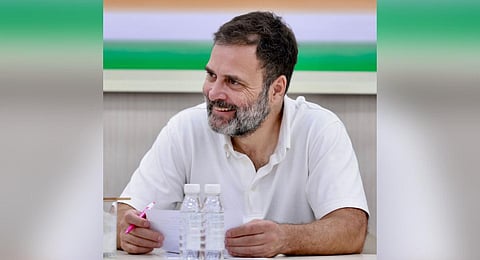

With the 2024 general elections looming large, newly-reinstated Lok Sabha MP and former Congress party president Rahul Gandhi faces possibly the greatest challenge of his nearly two-decade-long political career.
Fresh off the Bharat Jodo Yatra, the sixth-generation member of the Gandhi-Nehru family is seen as the de facto leader of the INDIA coalition, which is preparing to take on the might of the ruling BJP-led NDA coalition and by extension, Prime Minister Narendra Modi. At this crucial juncture, journalist-writer Sugata Srinivasaraju’s upcoming book, Strange Burdens: The Politics and Predicaments of Rahul Gandhi (Penguin India; Rs 699), charts the evolution of Gandhi’s politics and ideology.
“I wasn’t planning to write this book. It was suggested by my publisher. I didn’t want to write a fully-fledged book yet, otherwise it would have been unfair to Rahul Gandhi. One needs time to meet him, interview him and search through the archival materials available. And he’s still young, has never held administrative positions – he hasn’t lived a full life yet. He hasn’t filled up the archives the same way someone like [former Prime Minister] HD Deve Gowda has. There were a lot of constraints. I’ll probably do a proper one at a later point,” says Srinivasaraju, who emphasises that Strange Burdens is more of a long-ish New Yorker style column, rather than a biography.
A veteran journalist with nearly three decades of experience, Srinivasaraju says the book is a political commentary. He makes it clear that he isn’t seeking to expose anybody, but rather show the readers alternative possibilities for the events that have transpired. “From day one of his political career, I have watched him – how he behaved between then and 2009, what happened in 2014 and 2019. So there’s that experience. You have a larger idea of how things have moved. I’m not a political scientist writing about Gandhi, but my profession has allowed me to look at him closely. That could be my strength but also my limitation. I have no pretensions about anything,” he explains, adding, “I don’t try to expose anybody, it’s not my style. Rather, I try to keep things out there and allow the readers to make sense of it and guide them to sort of see other possibilities as well.”
Despite the obvious significance of the book given the current political state of the country, Srinivasaraju stresses that Strange Burdens isn’t written with the intention to influence any conversation.
“It is taking a closer look at a very important political person at this juncture. Obviously, you cannot talk about Rahul Gandhi without talking about Narendra Modi. There are ample contrasts that come out of the book. But as a writer, I don’t fall into these easy polarising black-and-white elements. For me, grey is more interesting. I don’t think either Congress or the BJP will be able to make use of this book. I have my share of critics from both sides of the aisle,” he adds.
What Strange Burdens is doing, according to Srinivasaraju is looking at Gandhi with critical sympathy. “We only speak about his privileges, but we don’t speak about his burdens. It’s easy to say he’s a fifth-generation dynast, he’s this and that, and that he needs to vanish from the face of the earth. But he’s there because society allows him to, and his party allows him to. If the people want to reject him, they will,” says Srinivasaraju, adding that he is most impressed by Gandhi’s ability to weather the sheer amount of pain and trauma that he has endured in his personal life.
Long perceived as an ineffectual and inexperienced politician, Gandhi has previously faced criticism for being too conservative with his politics. So is Gandhi up to the challenge that faces him in 2024?
“In the last few years, he’s been sufficiently radical. He’s trying to be an iconoclast, trying to smash a few things. It’s unfair to call him conservative in that sense. In fact, if he was conservative, he would have survived better in the Congress Party, which itself is very conservative,” says Srinivasaraju.